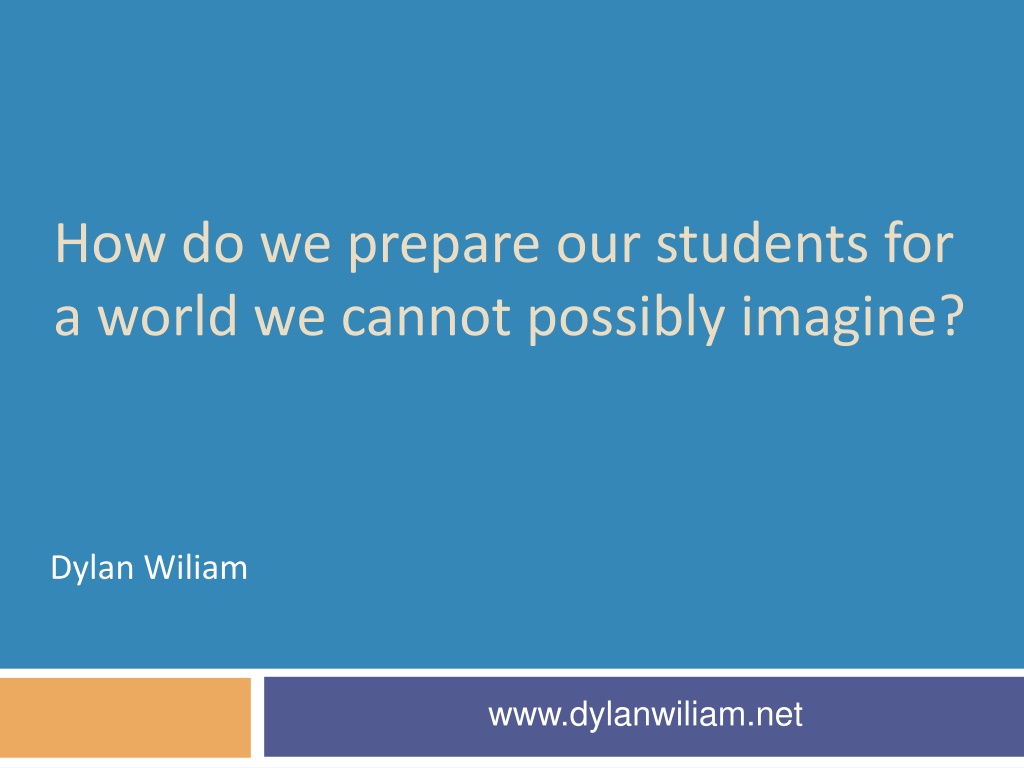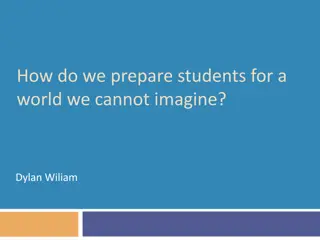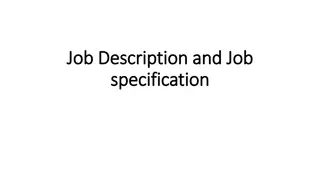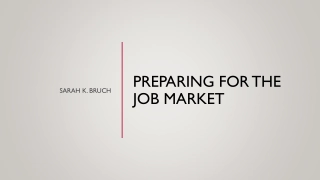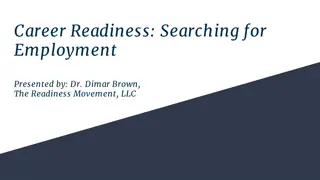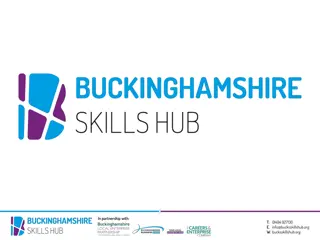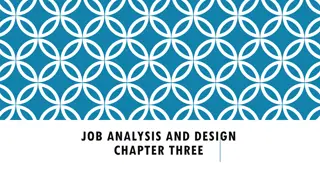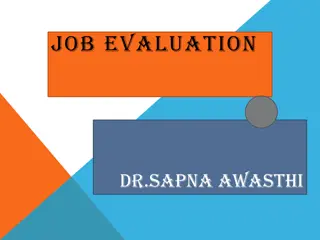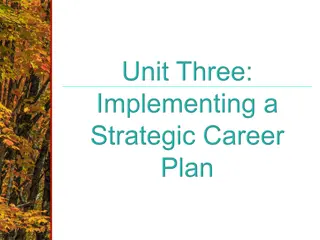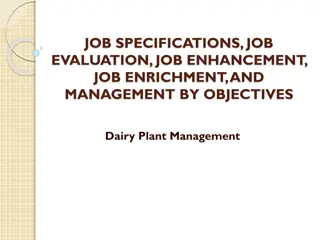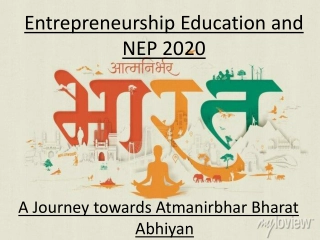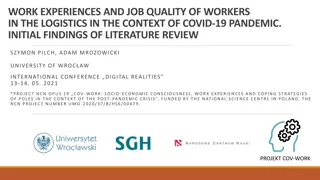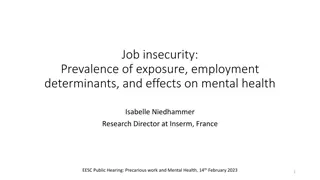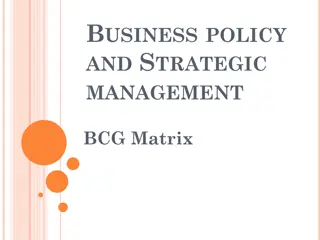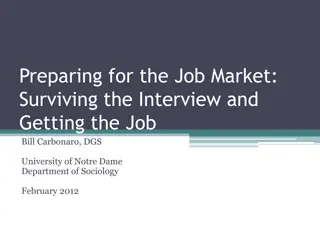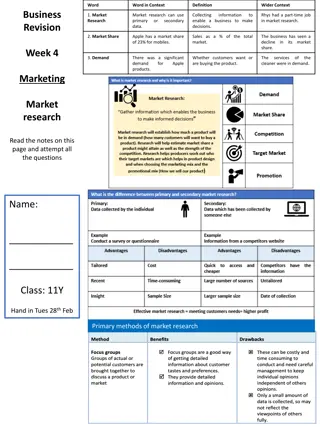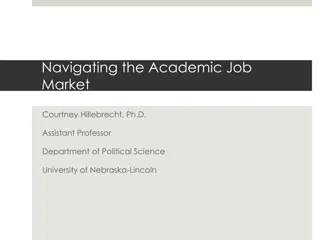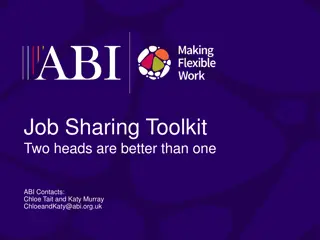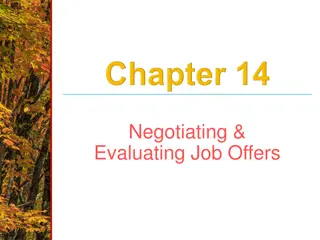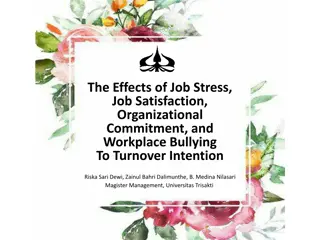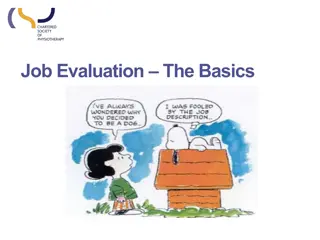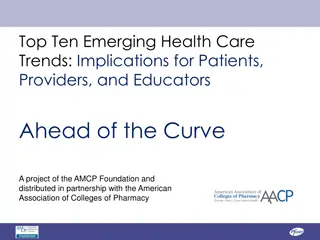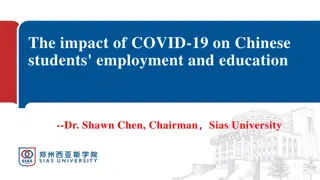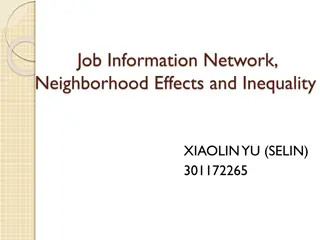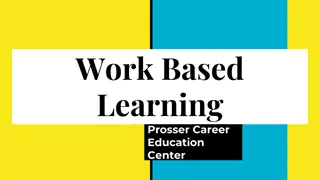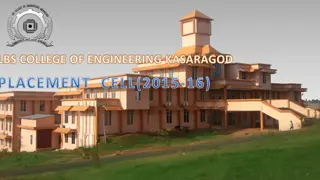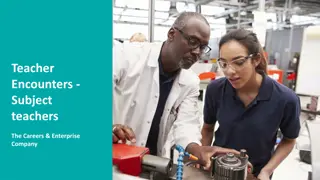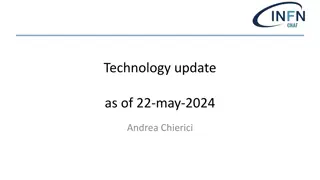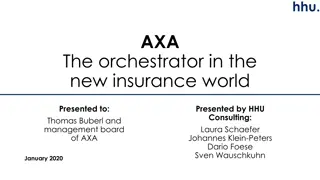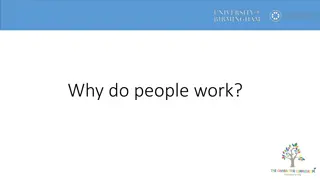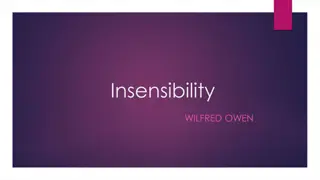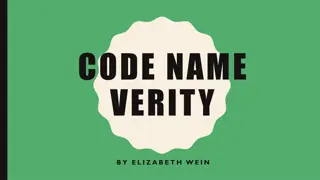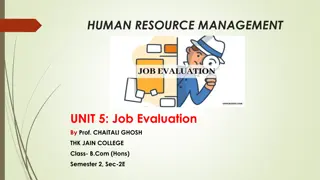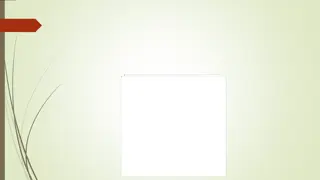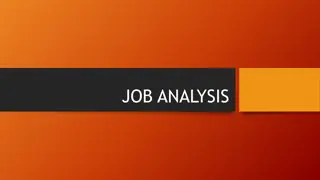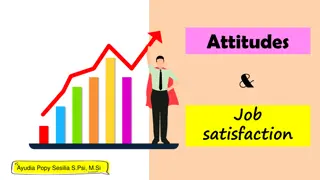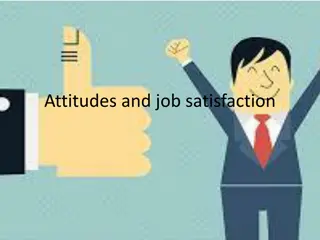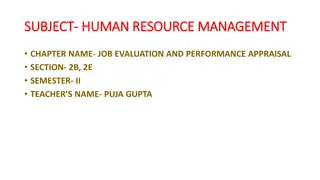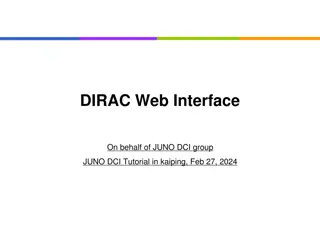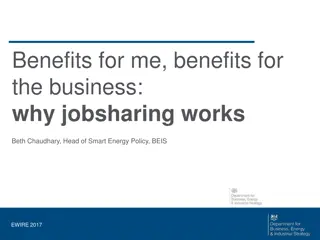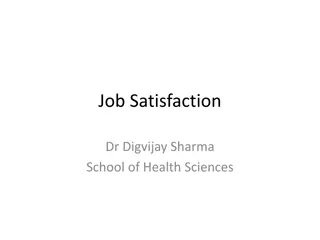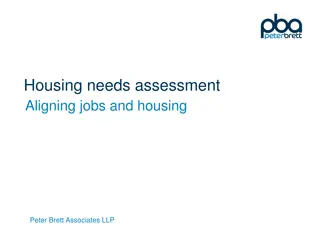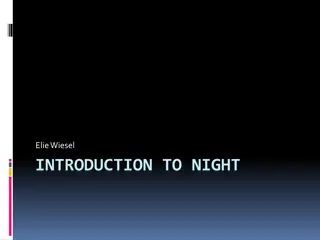Preparing Students for an Unimaginable Future: Education and Job Market Trends
The purpose of education is multifaceted, encompassing personal empowerment, cultural transmission, citizenship preparation, and work readiness. With a looming global job scarcity, it is crucial to equip students with adaptable skills for an evolving world. The key 21st-century skill is the ability to learn and respond effectively to unforeseen challenges. Education must focus on cultivating this skill to ensure success in an increasingly competitive and dynamic environment.
Download Presentation

Please find below an Image/Link to download the presentation.
The content on the website is provided AS IS for your information and personal use only. It may not be sold, licensed, or shared on other websites without obtaining consent from the author. Download presentation by click this link. If you encounter any issues during the download, it is possible that the publisher has removed the file from their server.
E N D
Presentation Transcript
How do we prepare our students for a world we cannot possibly imagine? Dylan Wiliam www.dylanwiliam.net
What is the purpose of education? 2 Four main philosophies of education Personal empowerment Cultural transmission Preparation for citizenship Preparation for work All are important Any education system is a (sometimes uneasy) compromise between these four forces ?
The coming war for jobs (Clifton, 2011) Right now 7 billion people on earth 5 billion adults 3 billion people who want to work 90% of these want to work full time As a consequence 2.7 billion full-time formal jobs are wanted with only 1.2 billion full-time formal jobs available A shortfall of 1.5 billion jobs So, for every UK worker, there are 50 people who would like their job ?
Meet Maddie Parlier 4 Davidson (2012) ?
How flat is the world? 5 Percentage crossing national boundaries Physical mail: 1. 2. 3. 10% 4. 20% 5. 50% 2% 5% Telephone minutes: Internet traffic: First generation immigrants: University students: People, ever in their lives: Goods and services: Ghemawat (2011) ?
Mostly round; some flat bits 6 Percentage crossing national boundaries Physical mail: 1 Telephone minutes: 2 Internet traffic: 17 First generation immigrants: 3 University students: 2 People, ever in their lives: 10 Goods and services: 10 Ghemawat (2011) ?
There is only one 21st century skill 7 So the model that says learn while you re at school, while you re young, the skills that you will apply during your lifetime is no longer tenable. The skills that you can learn when you re at school will not be applicable. They will be obsolete by the time you get into the workplace and need them, except for one skill. The one really competitive skill is the skill of being able to learn. It is the skill of being able not to give the right answer to questions about what you were taught in school, but to make the right response to situations that are outside the scope of what you were taught in school. We need to produce people who know how to act when they re faced with situations for which they were not specifically prepared. (Papert, 1998) ?
Successful education? 8 The test of successful education is not the amount of knowledge that a pupil takes away from school, but his appetite to know and his capacity to learn. If the school sends out children with the desire for knowledge and some idea how to acquire it, it will have done its work. Too many leave school with the appetite killed and the mind loaded with undigested lumps of information. The good schoolmaster is known by the number of valuable subjects which he declines to teach. The Future of Education (Livingstone, 1941 p. 28) ?
Getting smart(er) about school improvement 9 Key failures Failure to take into account relevant variables Policy tourism ( Post hoc ergo propter hoc ) Failing to consider the role of chance ?
Between-school effects are small In England, as long as you go to school, it doesn t matter very much which school you go to 93% of the variation in the proportion of 16-year olds gaining 5 A*-C at GCSE is outside the school s control If 15 students in a class get 5 A*-C in the average school: 17 students will do so at a good school (1sd above mean) 13 students will do so at a bad school (1sd below mean) For passing a threshold (e.g., 5 A*-C), only 10% of students are close enough for the difference between an average and a good school to make a difference Wiliam (2010); Allen and Burgess (2010) ?
because they are dwarfed by other factors 11 Between-school effects are small, because Differences between students are huge Teacher effects are large, but Good teachers are randomly distributed across schools This is why policies focused on schools have had little impact ?
Learning from other countries Learning from other countries selectively 12 Strategy Example Example Singapore Singapore Counter-example Korea School choice School choice Teacher pay Teacher pay Korea Korea Australia School autonomy School autonomy Netherlands Netherlands Singapore Teacher quality Teacher quality Finland Finland Ireland High-stakes testing High-stakes testing Canada Canada Finland ?
Fooled by randomness (Taleb, 2001) 14 Reliability in public examinations Small high schools From good to great (or not) Secrets of your success Teacher observations ?
Heres what we know about teaching 15 We don t know who will be good teachers We can t tell good teaching: when we see it by looking at value-added test scores ?
The dark matter of teacher quality 16 Mathematics Reading Primary Middle High Primary Middle High General theory of education courses ve Teaching practice courses ve +ve Pedagogical content courses +ve +ve Advanced university courses ve +ve Aptitude test scores ve Harris and Sass (2007) ?
Observations and teacher quality 17 Reading Mathematics 20 So, the highest rated teachers are 30% more productive than the lowest rated Percentage change in rate of learning 15 10 5 0 -5 But the best teachers are 400% more productive than the least effective -10 -15 Unsatisfactory Basic Proficient Distinguished Sartain, Stoelinga, Brown, Luppescu, Matsko, Miller, Durwood, Jiang, and Glazer (2011) ?
Expertise 19 Grandmaster chess players don t have higher IQs than average chess players Top surgeons don t have higher IQs, medical school grades, or higher manual dexterity than average surgeons In general, measures of general ability account for 4% of the variability in performance ?
The role of deliberate practice 20 Music professors at the Hochschule der Kuenst (Academy of Music) Berlin identified 10 violin students who had the potential for careers as international soloists ( best students) The professors also identified a sample of 10 good, but not outstanding students ( good students) Researchers recruited another 10 students training to be music teachers who specialised in the violin ( Music Ed students) An additional 10 middle-aged professional violinists from two local orchestras were recruited to the study Groups were matched in sex (7f, 3m) and for the first three groups, age ?
How much do violinists practice? Music Ed Good Best Professionals 35 Hours of practie per week 30 25 20 15 10 5 0 4 9 14 19 Age Ericsson, Krampe, and Tesch-R mer (1993) ?
Violinists hours of practice (cumulative) 22 Music Ed Good Best Professionals Cumulative hours of practice 10000 8000 6000 4000 2000 0 4 6 8 10 12 Age 14 16 18 20 ?
These differences are substantial 23 Hours of practice by age 18 Music Education students 3420 Good violin students Best violin students 5301 7410 Professional musicians 7336 By the age of 18, the best violinists have accumulated 40% more practice than good violinists Since the amount of deliberate practice being undertaken by the best students once they are adults is close to the maximum possible, it is, essentially, impossible for the good students to catch up to the best. ?
Talent is over-rated 24 ?
General conclusions about expertise 25 Elite performance is the result of at least a decade of maximal efforts to improve performance through an optimal distribution of deliberate practice What distinguishes experts from others is the commitment to deliberate practice Deliberate practice is an effortful activity that can be sustained only for a limited time each day neither motivating nor enjoyable it is instrumental in achieving further improvement in performance ?
Effects of experience in teaching 26 1 1 Mathematics Reading Extra months per year o f learning 0 0 -1 -1 -2 -2 -3 -3 -4 -4 -5 -5 Years of teaching experience Years of teaching experience 0 1 2 3 to 5 0 1 2 3 to 5 Rivkin, Hanushek and Kain (2005) ?
Implications for education systems Pursuing a strategy of getting the best and brightest into teaching is unlikely to succeed Currently all teachers slow, and most actually stop, improving after two or three years in the classroom Expertise research therefore suggests that they are only beginning to scratch the surface of what they are capable of What we need is to persuade those with a real passion for working with young people to become teachers, and to continue to improve as long as they stay in the job. There is no limit to what we can achieve if we support our teachers in the right way ?
